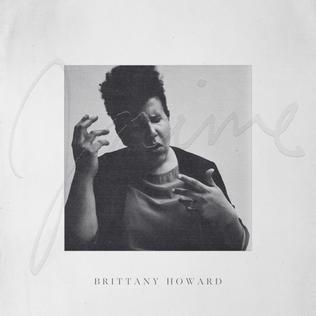AFTER MORE than a decade as the frontwoman for the rock ’n’ soul band Alabama Shakes, Brittany Howard has struck out on her own and released her first solo album, titled simply Jaime. The timing is surprising, because Alabama Shakes remains on an upward trajectory. Their sophomore effort, “Sound and Color” (2015), won four Grammys after debuting at Number One on Billboard. Yet female lead singers are often singled out from their male bandmates and, after performing the Albert King classic “Born under a Bad Sign” at the White House in 2013, Howard was invited back to participate in a tribute to Ray Charles. The audience was elated, especially President Obama, who shook her father’s hand and later sent him an autograph. As she told The New Yorker’s David Remnick, Alabama Shakes may regroup, but it may not. Meanwhile, her side projects and involvement in bands like Bermuda Triangle and Thunderbitch are further proof of Howard’s desire to shake loose. Her wife, Jesse Lafser, is also a member of Bermuda Triangle.

Howard’s influences include P-Funk, Usher, TLC, and a grandmother who used to chop onions in the kitchen and hum along to doo-wop. You can hear Prince’s influence in the howls on “Grace” and Nina Simone’s on “Short and Sweet.” The daughter of a biracial couple, Howard grew up in a trailer park in Athens, Alabama, where she taught herself guitar. The song “Georgia” is directed toward a female object of desire and rife with the ambivalence that comes with being young, gay, and confused: “I can’t help the way that I was born to be. … I ain’t no little boy/ I just want Georgia to notice me.” The gender equivocation continues on “He Loves Me,” though the song, true to her Southern roots, is about churchgoing and God. Interspersed with the spoken word of a preacher’s sermon, she wails: “I don’t go to church anymore/ I know he still loves me.”
The album’s title is a tribute to her sister Jaime, who died at thirteen of a rare form of eye cancer. Howard does not sing directly to that early loss, but she does recall other traumas. At some point during her childhood, someone vandalized her father’s car, leaving a severed goat head in the backseat, and she’s never forgotten it. The slow-burn “Goat Head” takes its time in an improvisational style: “I guess I’m not supposed to mind ’cause I’m brown, I’m not black. … I’m one drop of three-fifths, right?”
Beyond “Goat Head,” Jaime is Howard’s most forceful expression of her politics, and it could have only been recorded at this point in American history. In the opener, “History Repeats,” she recites, mantra-like, more than a dozen times: “History repeats and we defeat ourselves/ Come on everybody, one more time again.” While road-tripping across the U.S., Howard and her wife felt afraid. In Wyoming, the driver of a white truck, flying a Confederate flag, threw firecrackers at the couple. Howard, now thirty, has confessed to feeling helpless at that moment, but also angry, and it’s that anger that propels a song like “13th Century Metal” (recorded in one take). It’s not a song in the conventional sense but a sonic cauldron of beats and fuzzy distortion. “We are all brothers and sisters,” Howard exclaims. This is an incantatory jam, compliments of the Grammy-winning pianist and producer Robert Glasper and written after the election of Donald Trump.
The silver lining when living under a vicious autocrat, as we are now, is the resurgence of protest music. Howard told Remnick: “Having a man like that in office is very dangerous. Just look around you, man. It’s just inciting people to do all kinds of things. … It’s a necessary evil to maybe get to the next place where we can fix some ruptures in our society.” Her three-year relationship with Lafser has inspired some of the best tracks on the album, even the despairing “Short and Sweet.” “Time is gonna’ kill it,” she sings, longing for that initial rush of desire, when love was new: “I only want the beginning.” Howard herself could be at the beginning of something big.
Colin Carman, assistant professor of English at Colorado Mesa Univ., is working on a book titled The Rational Happiness of Jane Austen.






